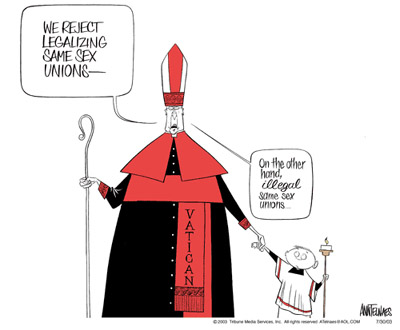Depends on how you define influence I guess. But people get pretty interested in sex, procreation, and the aggrandizement of their family. Is that influenced by our mortality? Perhaps.Fist and Faith wrote:Different individuals react in different ways. As a species, it's difficult to imagine anything having a stronger influence. It's one of the things that makes up the soil that our collective consciousness grew from.
A Problem of Logic
Moderator: Fist and Faith
- Obi-Wan Nihilo
- Pathetic
- Posts: 6503
- Joined: Thu Feb 04, 2010 3:37 pm
- Has thanked: 6 times
- Been thanked: 4 times

The catholic church is the largest pro-pedophillia group in the world, and every member of it is guilty of supporting the rape of children, the ensuing protection of the rapists, and the continuing suffering of the victims.
- Fist and Faith
- Magister Vitae
- Posts: 25482
- Joined: Sun Dec 01, 2002 8:14 pm
- Has thanked: 9 times
- Been thanked: 57 times
- Mighara Sovmadhi
- The Gap Into Spam
- Posts: 1157
- Joined: Mon Feb 23, 2009 6:50 am
- Location: Near where Broken Social Scene is gonna play on October 15th, 2010
peter, to hopefully offer a version of an answer to your question that gets at what various other posters have said:
There is something of a debate in the philosophy of logic over semantic versus syntactic explanations of the act of inference (at least this is my take on the debate between proof- and truth-theoretic semantics(!)). When we have an "argument" like, "All A are B, and all B are C; so all A are C," it appears that the syntax of the sentence gives us the conclusion, via elaborations upon the idea of modus ponens. Once we fill in the variables with words with specific meanings, though, it looks like the meaning of the filled-in variables contributes to the act of inference. So we don't say, "All politicians are snakes, and snakes don't have legs, so politicians just slither around" (unless we mean "slither" in some funny way).
And to make matters that much worse, of course, some people think that the syntactic force of inference follows from the semantics for words like "if" (as if "if" means the idea of modus ponens).
EDIT: Check this out: plato.stanford.edu/entries/logical-form/
EDIT 2: On second thought, I'm not sure the proof- vs. truth-theoretic semantics debate thingamajig has to do, directly, with the topic at hand. But there is a similar distinction in theories about the act of inference, I believe.
There is something of a debate in the philosophy of logic over semantic versus syntactic explanations of the act of inference (at least this is my take on the debate between proof- and truth-theoretic semantics(!)). When we have an "argument" like, "All A are B, and all B are C; so all A are C," it appears that the syntax of the sentence gives us the conclusion, via elaborations upon the idea of modus ponens. Once we fill in the variables with words with specific meanings, though, it looks like the meaning of the filled-in variables contributes to the act of inference. So we don't say, "All politicians are snakes, and snakes don't have legs, so politicians just slither around" (unless we mean "slither" in some funny way).
And to make matters that much worse, of course, some people think that the syntactic force of inference follows from the semantics for words like "if" (as if "if" means the idea of modus ponens).
EDIT: Check this out: plato.stanford.edu/entries/logical-form/
EDIT 2: On second thought, I'm not sure the proof- vs. truth-theoretic semantics debate thingamajig has to do, directly, with the topic at hand. But there is a similar distinction in theories about the act of inference, I believe.


